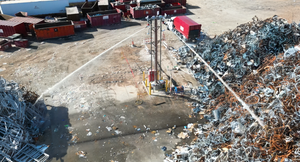How Cities Are Leading the Charge to Replace Single-Use Packaging with Reuse Systems
Single-use packaging is a huge headache for many professionals in the recycling industry. All too often we see companies pump out resource-heavy products that are thrown away in an instant, heading directly to a landfill. Fortunately, organizations in the industry are taking steps to pivot all of us away from single-use to reuse. Some of those leaders took the stage at the Resource Recycling Conference to share lessons, improvements, and strategic action in the reuse system.

Single-use packaging is a huge headache for many professionals in the recycling industry. All too often we see companies pump out resource-heavy products that are thrown away in an instant, heading directly to a landfill. Fortunately, organizations in the industry are taking steps to pivot all of us away from single-use to reuse. Some of those leaders took the stage at the Resource Recycling Conference to share lessons, improvements, and strategic action in the reuse system.
The panel, Urban Leadership in Reuse: Policy and Strategic Action, brought together four speakers making waves in the reuse sector with innovative projects. The session was moderated by Macy Zander, Local Reuse Manager, Upstream. Zander was joined by Elizabeth Balkan, Director, Reloop North America; Leslie Lukacs, Executive Director, Zero Waste Sonoma; McKenna Morrigan, Strategic Advisor, Seattle Public Utilities; and Andy Rose, Head of Circular Systems Modeling, Perpetual.
Before Zander kicked off the Q&A portion of the discussion, she shared stark numbers from single-use packaging production. She stated that 15% of all wood harvested, 22% of all aluminum mined, 40% of plastic created, and 40% of glass produced go toward single-use packaging production, and nearly a trillion disposable food service products are used every year in the United States. Additionally, disposable food and beverage packaging makes up 67% of litter found in the environment. These significant numbers are glaring reasons why single-use production is increasingly problematic to our economy and environment.
Fortunately, there is good news, as organizations in different cities are prioritizing “reduce and reuse” initiatives in packaging. These organizations and local governments are working to shift packaging away from single-use to reuse models and to date, 99 policies have been passed to promote source reduction or reuse. For Andy Rose at Perpetual, the reason they focus on reuse systems is for the numerous benefits that the systems can offer, particularly with human health. Rose spoke about different studies showing that food contact surfaces are leaching chemicals into the food that we eat.
“Endocrine disruptors are found to have negative health consequences related to reproductive health and behavioral disorders, and sometimes this is an issue that is underrepresented in the packaging world,” said Rose. “There are health concerns that really require us to get off of single-use disposable packaging.”
SEE ALSO: Women in Circularity Share Insights on Shaping the Future of Recycling and Sustainability
Perpetual focuses on open-loop reuse models city-wide systems that allow consumers to borrow reusable items across multiple businesses, return them to conveniently placed collection bins and rely on centralized facilities for cleaning and redistribution. This model seeks to replicate the convenience of existing waste systems while fostering a circular, sustainable economy. Rose explained that Perpetual is currently working with Galveston, Tx., Ann Arbor, Mi., Hilo, Hi., and Savannah, Ga., tailoring reuse systems to each location, aiming to create models that can be replicated nationwide for a more sustainable future.
From Reloop, Elizabeth Balkan explains that the company believes that cities are uniquely positioned as the centers of population, innovation, and economic activity which allows for the scale and resources needed for systemic transformation, ready to drive the transition to a reuse economy. A few years ago, Reloop began hosting reuse tours, taking government officials, industry leaders, and other partners to Europe to showcase some of the exciting initiatives that the company is working on and to learn about what has not been working.
Balkan shared examples of different cities focusing on reuse, such as Germany’s beverage reuse system which sees over 80% of beer and nearly half of all beverages are sold in reusable containers. Aarhus in Denmark has an open-loop city-wide initiative that showcases how cities can align reuse with broader climate goals while addressing barriers such as cost and convenience.
“Realizing the full potential of reuse really requires bold and coordinated action from cities across multiple fronts,” explained Balkan. “We know this is not going to be easy, and what we’re hoping to see emerge in the years ahead is to build capacity for the collaboration across agencies.”
In a more targeted perspective, McKenna Morrigan, spoke about the initiatives happening around Seattle, Wash., including the citywide program, Reuse Seattle. Reuse Seattle works to advance waste reduction and climate goals by embedding reuse into the city’s systems and culture. Recognizing the limits of recycling and composting, the city’s latest solid waste management plan focuses on upstream solutions to reduce waste at the source.
Morrigan laid out several key actions happening in Seattle, such as public campaigns to encourage residents to embrace reuse practices, city-sponsored services and initiatives like a “borrow a cup” program for cafes, festivals, and farmer’s markets to tackle single-use waste, and special events to test large-scale reuse systems.
“The three R’s have been at the heart of our policy and our programming for many years, and we more firmly embedded that in our latest solid waste management plan,” said Morrigan.
“This is a foundational regulatory document, and it also serves as an opportunity to really embed forward-thinking action around reduction and reuse. As a city, we took that opportunity to really frame out action in our next solid waste management plan around moving upstream, reducing waste and pollution at the source, and really centering waste.”
Rounding out the panel, Leslie Lukacs took time to speak about a pilot reuse program happening in Petaluma, Calif. The program, a three-month citywide reuse system for cups, led by Closed Loop Partners’ NextGen Consortium (funded by Starbucks, Coca-Cola, PepsiCo, and more). The system looked to remove single-use cups, requiring consumers to use purple branded cups from participating restaurants and shops which could be returned to specialized bins throughout the city. After the cups were returned, they were washed and given back to the participating locations to be used again, saving cup waste from going to the trash.
“Every cup adds up. At the time, we reached 100,000 cups returned. That was a win. In the three-month pilot, as the pilot ended, we actually received 200,000 cups back,” said Lukacs. “The population of Petaluma is 60,000 so that roughly [means cups were] reused at least three times per cup.”
Lukacs explained to get the city on board, the program sought out numerous avenues of awareness and education for consumers to properly return the cups. Marketing campaigns were leveraged to get the message to residents through social media, news channels, and local influencers to promote the program. The cups were also equipped with QR codes so the program could get accurate data on return patterns and usage, as well as locations where returns happen more often. This success serves as a model for other cities to implement reuse systems and cut down on waste.
The optimism in the industry is that the conversation around single-use is getting louder and with bold action, innovative systems, and dedicated collaboration, the elimination of single-use packaging and items is possible. While issues like convenience, education, and infrastructure stand in the industry’s way, citywide initiatives and global partnerships are proving that reducing waste is an achievable reality and the path forward is clear: reuse is a major key in reducing waste. The panel proved that when pairing creativity, collaboration, and commitment, we can create a more sustainable future.
Read more about:
SustainabilityAbout the Author
You May Also Like




.png?width=300&auto=webp&quality=80&disable=upscale)